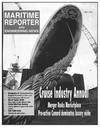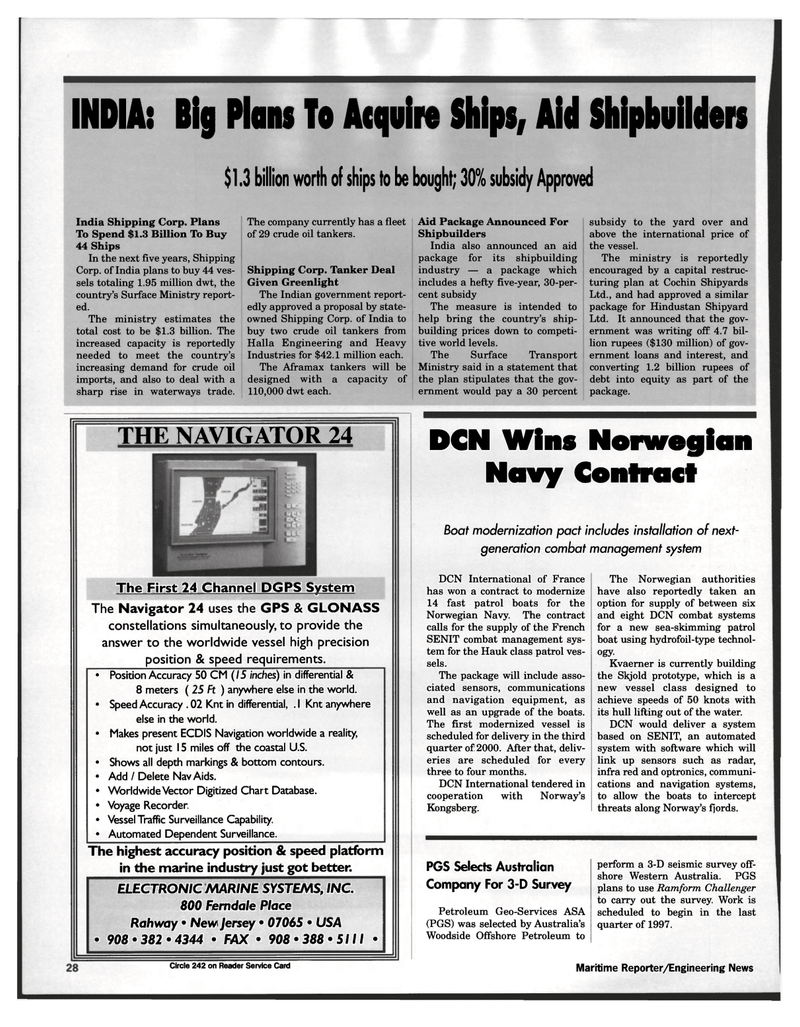
Page 28: of Maritime Reporter Magazine (July 1997)
Read this page in Pdf, Flash or Html5 edition of July 1997 Maritime Reporter Magazine
INDIA: Big Plans To Acquire Ships, Aid Shipbuilders $1.3 billion worth of ships to be bought; 30% subsidy Approved
India Shipping Corp. Plans
To Spend $1.3 Billion To Buy 44 Ships
In the next five years, Shipping
Corp. of India plans to buy 44 ves- sels totaling 1.95 million dwt, the country's Surface Ministry report- ed.
The ministry estimates the total cost to be $1.3 billion. The increased capacity is reportedly needed to meet the country's increasing demand for crude oil imports, and also to deal with a sharp rise in waterways trade.
The company currently has a fleet of 29 crude oil tankers.
Shipping Corp. Tanker Deal
Given Greenlight
The Indian government report- edly approved a proposal by state- owned Shipping Corp. of India to buy two crude oil tankers from
Halla Engineering and Heavy
Industries for $42.1 million each.
The Aframax tankers will be designed with a capacity of 110,000 dwt each.
Aid Package Announced For
Shipbuilders
India also announced an aid package for its shipbuilding industry — a package which includes a hefty five-year, 30-per- cent subsidy
The measure is intended to help bring the country's ship- building prices down to competi- tive world levels.
The Surface Transport
Ministry said in a statement that the plan stipulates that the gov- ernment would pay a 30 percent subsidy to the yard over and above the international price of the vessel.
The ministry is reportedly encouraged by a capital restruc- turing plan at Cochin Shipyards
Ltd., and had approved a similar package for Hindustan Shipyard
Ltd. It announced that the gov- ernment was writing off 4.7 bil- lion rupees ($130 million) of gov- ernment loans and interest, and converting 1.2 billion rupees of debt into equity as part of the package.
THE NAVIGATOR 24
The First 24 Channel DGPS System
The Navigator 24 uses the GPS & GLONASS constellations simultaneously, to provide the answer to the worldwide vessel high precision position & speed requirements. • Position Accuracy 50 CM (15 inches) in differential & 8 meters (25 Ft ) anywhere else in the world. • Speed Accuracy . 02 Knt in differential, . I Knt anywhere else in the world. • Makes present ECDIS Navigation worldwide a reality, not just 15 miles off the coastal U.S. • Shows all depth markings & bottom contours. • Add / Delete Nav Aids. • Worldwide Vector Digitized Chart Database. • Voyage Recorder. • Vessel Traffic Surveillance Capability. • Automated Dependent Surveillance.
The highest accuracy position & speed platform in the marine industry just got better.
ELECTRONIC MARINE SYSTEMS, INC. 800 Ferndale Place
Rahway • New Jersey • 07065 • USA • 908*382 '4344 • FAX • 908-388' Sill •
Circle 242 on Reader Service Card
DCN Wins Norwegian
Navy Contract
Boat modernization pact includes installation of next- generation combat management system
DCN International of France has won a contract to modernize 14 fast patrol boats for the
Norwegian Navy. The contract calls for the supply of the French
SENIT combat management sys- tem for the Hauk class patrol ves- sels.
The package will include asso- ciated sensors, communications and navigation equipment, as well as an upgrade of the boats.
The first modernized vessel is scheduled for delivery in the third quarter of 2000. After that, deliv- eries are scheduled for every three to four months.
DCN International tendered in cooperation with Norway's
Kongsberg.
PGS Selects Australian
Company For 3-D Survey
Petroleum Geo-Services ASA (PGS) was selected by Australia's
Woodside Offshore Petroleum to
The Norwegian authorities have also reportedly taken an option for supply of between six and eight DCN combat systems for a new sea-skimming patrol boat using hydrofoil-type technol- ogy.
Kvaerner is currently building the Skjold prototype, which is a new vessel class designed to achieve speeds of 50 knots with its hull lifting out of the water.
DCN would deliver a system based on SENIT, an automated system with software which will link up sensors such as radar, infra red and optronics, communi- cations and navigation systems, to allow the boats to intercept threats along Norway's fjords. perform a 3-D seismic survey off- shore Western Australia. PGS plans to use Ramform Challenger to carry out the survey. Work is scheduled to begin in the last quarter of 1997.
Maritime Reporter/Engineering News

 27
27

 29
29
